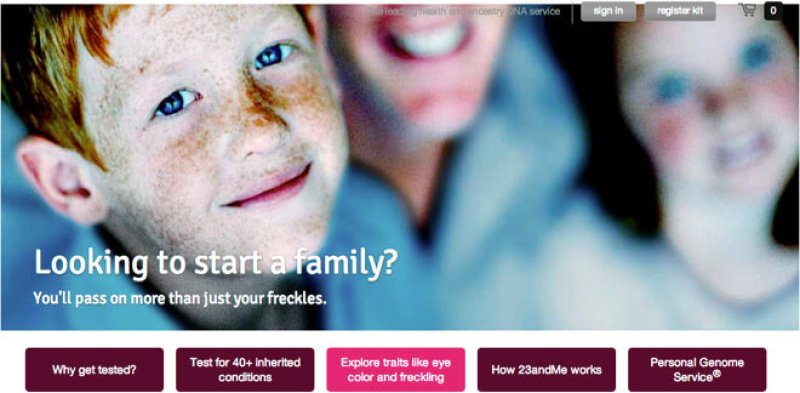Bloom syndrome is a very rare disease. People with the condition grow to less than 5 feet tall. They suffer from early cancers and die young, often by their twenties. And the syndrome is now the focus of an unlikely collaboration. Personal genetics company 23andMe applied to the FDA for approval of a genetic test for the disorder earlier this month, and the agency has accepted the application. But, it will likely be months before a formal approval is made.
Robert Hof, Forbes contributor, suggested this might be the first step in getting approval for the hundreds of individual tests formerly reported to 23andMe’s customers in its health report service, likely a very long and complicated process, especially for complex diseases. But, CEO and co-founder Anne Wojcicki’s comments do not indicate that’s the plan:
We’ve been very clear from Day One that we’re a little bit of a square peg in a round hole. We don’t necessarily fit into what they’re asking us to comply with. One of the things we’re doing that makes it really hard is that we’re not just a single type of test. The things that you need to know for carrier status vs. drug response are quite different and the things you have to prove to the FDA are at a different level of risk categorization. So that’s why our product is quite difficult, because not everything is the same level of risk.
Wojcicki did not elaborate beyond saying that the company is exploring different ways to get the necessary information to the FDA. It recently hired a number of key people with drug regulatory experience to help move the process forward. The FDA has argued that the 23andMe health tests are medical devices, like pace makers and insulin pumps, and should be regulated under the same processes. The company disagreed.
But 23andMe is moving its healthcare information business forward in other ways, by expanding its research capabilities and its outreach to industry and academic scientists through development of a research portal. In July, the National Institutes of Health awarded 23andMe $1.4 million for research database expansion.
The company has always conducted its own research, but now includes several collaborations including Parkison’s disease research and pharmaceutical companies who are interested in tapping the genetics database to guide drug development. It’s currently teaming with Pfizer to study genetics in inflammatory bowel disease. The pharma company has two anti-inflammatory drugs targeting IBD in its pipeline.
In the big picture, 23andMe wants to act as a clearinghouse for a lot of genetic data, thereby increasing efficiency because research subjects would get sequenced once instead of in each study they are participants. That would reduce costs and open up huge avenues for data analysis, Wojcicki said:
We have so much information about humanity that we almost become the ultimate epidemiological company with genetic information that can be used for research. Intellectually the driving force for me is you have a question about you and get answers. Like if I drink a lot of diet soda when I’m pregnant, is my child at higher risk of autism? There’s an infinite number of questions you’d like to ask.
Read the full interview with 23andMe CEO Anne Wojcicki: ‘We are going for change’: A conversation with 23andMe CEO Anne Wojcicki
Meredith Knight is a blogger for Genetic Literacy Project and a freelance science and health writer in Austin, Texas. Follow her @meremereknight.
Additional Resources:































